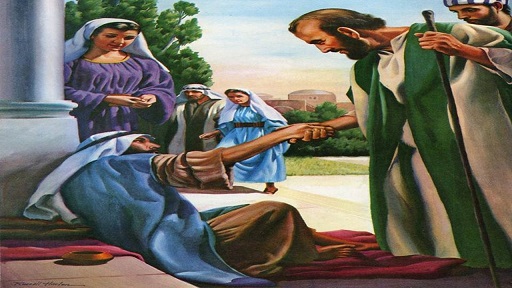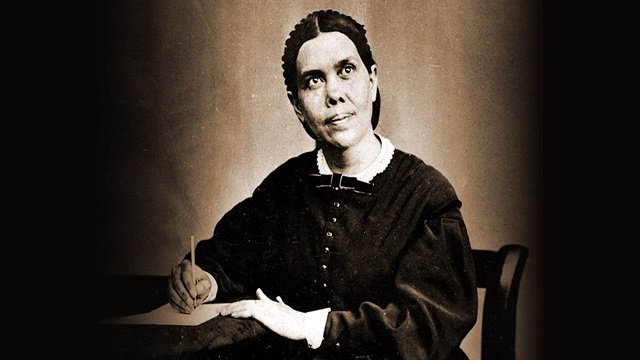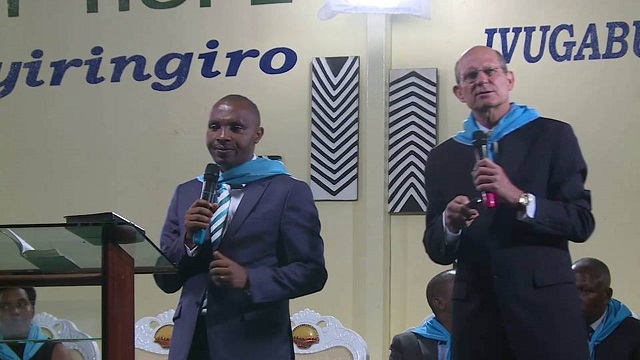LESSON 11
LET YOUR WOMEN KEEP SILENCE IN THE CHURCHES: AN EXPOSITION ON PAUL'S WORDS IN 1 CORINTHIANS 14:34
You are welcome to another edition of Insights from God's Word, a Bible study programme that is committed to sharing God's Word by allowing the Bible to speak for itself.
In this edition, we continue with our series on The Gifts of the Spirit. The topic for this study is: "Let your women keep silence in the churches": An exposition on Paul's words in 1 Corinthians 14:34. The complete passage in which this text is positioned reads: "34 Let your women keep silence in the churches: for it is not permitted unto them to speak; but they are commanded to be under obedience as also saith the law. 35 And if they will learn any thing, let them ask their husbands at home: for it is a shame for women to speak in the church" (1 Corinthians 14:34-35). In order for us to critically examine this topic, we will categorise this study into five sub-sections as follows:
1) AN EXAMINATION OF THE PASSAGE OF CONTENTION (1 CORINTHIANS 14:34-35)
Some in Christendom have argued for women to keep silent in the church based on Paul's words in 1 Corinthians 14:34-35. In fact, a casual reading of this passage is likely to suggest to the reader that women are always to keep silent in the church. But when we examine the context of the chapter in which this passage in situated, we are likely to come away with a different perspective in relation to this Pauline prohibition. Thankfully, we have already considered the entire chapter of 1 Corinthians 14 in our study on the gift of tongues.
Friends, in our study of the gift of tongues in 1 Corinthians 14, we noted the disorderly nature of the church at Corinth. In resolving this problem, the apostle Paul had the cause to make the following statement: "How is it then, brethren? when ye come together, every one of you hath a psalm, hath a doctrine, hath a tongue, hath a revelation, hath an interpretation. Let all things be done unto edifying" (1 Corinthians 14:26). In the verses that followed this general advice, the apostle Paul directed the focus of his advice to particular group of persons in the church. We read the account as follows:
"14:27 If any man speak in an unknown tongue, let it be by two, or at the most by three, and that by course; and let one interpret.
14:28 But if there be no interpreter, LET HIM KEEP SILENCE IN THE CHURCH; and let him speak to himself, and to God.
14:29 Let the prophets speak two or three, and let the other judge.
14:30 If any thing be revealed to another that sitteth by, LET THE FIRST HOLD HIS PEACE.
14:31 For ye may all prophesy one by one, that all may learn, and all may be comforted.
14:32 And the spirits of the prophets are subject to the prophets.
14:33 For God is not the author of confusion, but of peace, as in all churches of the saints.
14:34 LET YOUR WOMEN KEEP SILENCE IN THE CHURCHES: for it is not permitted unto them to speak; but they are commanded to be under obedience as also saith the law.
14:35 And if they will learn any thing, let them ask their husbands at home: for it is a shame for women to speak in the church.
14:40 Let all things be done decently and in order."
(1 Corinthians 14:27-35, 40; Capital Emphasis Added)
Key Explanation: In the passage above, we learn that women were not the only group of persons who were directed to keep silent in the church. In the ongoing commotion that engulfed the Corinthian church, Paul found it necessary to command:
A) People who wanted to communicate in foreign languages to keep silent if there was no one around to interpret;
B) People with the gift of revelations to hold their peace or keep silent when someone with a similar gift was on the floor;
C) Women to keep silent by reserving their questions on issues that they did not understand for their husbands at home. This admonition by Paul suggests that some of the women were asking doctrinal questions in a haphazard manner that affected the smooth presentation of preachers and teachers in the church. Beloved, it is clear from the passage of 1 Corinthians 14 that the guidelines that the apostle Paul provided to the various groups were given to ensure orderliness in the worship service at the Corinthian church. We are sure of this through his statements such as:
"14:26 How is it then, brethren? when ye come together, every one of you hath a psalm, hath a doctrine, hath a tongue, hath a revelation, hath an interpretation. Let all things be done unto edifying.
14:33 For God is not the author of confusion, but of peace, as in all churches of the saints.
14:40 Let all things be done decently and in order."
(1 Corinthians 14:26, 33, 40)
In view of what we have gone through so far, it is clear that the apostle Paul did not give a blanket command for women to always keep silent in the church. As we have noted earlier, the command to keep silent was not solely directed at the women in the Corinthian church. This command was a general one which was to restore order in the worship service which had become chaotic. It is interesting to also learn that in the same letter to the Church at Corinth, Paul had earlier advised the women to cover their heads, as their custom demanded, before praying or prophesying in the congregation (see I Corinthians 11:1-16). Now, if the women in the Church at Corinth could pray and prophesy during worship service, then it presupposes that the issue Paul was addressing later on in the same church (review 1 Corinthians 14:34-35) was not specifically to bar women to remain silent at all times.
2) AN EXAMINATION OF A SECOND PASSAGE OF CONTENTION (1 TIMOTHY 2:11-12)
From Paul’s first letter to Timothy, we read the following: "11 Let the woman learn in silence with all subjection. 12 But I suffer not a woman to teach, nor to usurp authority over the man, but to be in silence (1 Timothy 2:11-12).
Besides the passage in 1 Corinthians 14:34-35, some in Christendom have also pointed to this passage above to further the teaching that women are commanded in Scripture to absolutely keep silent in the church. However, by comparing Scripture with Scripture, we come away with a different perspective on this issue. When we consider the letter that Paul wrote to the Ephesian church as a whole, as well as the ones he later addressed to Timothy, the local pastor of the Ephesian church, we obtain the following insights:
A) The Ephesian church was a target of false teachers (see Ephesians 4:14; Ephesians 5:6-13; 1 Timothy 1:1-7).
B) The false teachers targeted the women in the church (see 2 Timothy 3:6-9).
C) It is likely that the women who had bought into the doctrines of the false teachers argued with the men in the church on critical points of established church doctrine. This situation seems to have generated sharp contentions in the church. Paul had cause to address the men to pray and lift up holy hands "without anger or argument" (1 Timothy 2:8, NRSV). The apostle also admonished the women that instead of bringing up diverse controversies from outside, they should rather humble themselves, and learn at the feet of the men who were entrusted by the brethren to teach the entire congregation (review 1 Timothy 2:11-12). It is clear that Paul's words in 1 Timothy 2:11-12 were focused on resolving a particular problem in the Ephesian church, and as such cannot be utilised as a mandatory statement from Scripture which prohibits women from exercising leadership roles such as teaching in the church.
Beloved, besides the explanation we have gone through above, if one considers the passage in 1 Timothy 2:11-12 in the light of other passages which detail the work of women in the New Testament, it becomes very clear that the apostle Paul did not make a blanket statement prohibiting women from exercising leadership roles such as teaching in the church. A case in point can be found in Paul's letter to Titus, where we read the following clear command:
"2:3 The aged women likewise, that they be in behaviour as becometh holiness, not false accusers, not given to much wine, TEACHERS OF GOOD THINGS;
2:4 That they may teach the young women to be sober, to love their husbands, to love their children,
2:5 To be discreet, chaste, keepers at home, good, obedient to their own husbands, that the word of God be not blasphemed."
(Titus 2:3-5; Capital Emphasis Added)
In the passage above, we read that the aged women are to be teachers of good things so they may teach the young women in the right ways of the Lord. This passage confirms the point that the spiritual gift of teaching is not reserved for men alone. Despite this clear point, some may still argue that this passage only asserts that the aged women are to teach the younger women, and not the men in the church. Interestingly, this position is countered through the teaching work of one female church leader in the book of Acts. From Acts 18:24-26, we read the following in relation to this point:
"18:24 And a certain Jew named Apollos, born at Alexandria, an eloquent man, and mighty in the scriptures, came to Ephesus.
18:25 This man was instructed in the way of the Lord; and being fervent in the spirit, he spake and taught diligently the things of the Lord, knowing only the baptism of John.
18:26 And he began to speak boldly in the synagogue: whom when Aquila and Priscilla had heard, they took him unto them, and expounded unto him the way of God more perfectly."
(Acts 18:24-26)
In the passage above, we are told how Aquilla and his wife Priscilla, took Apollos unto themselves, and taught him the ways of God more perfectly. In this story in the book of Acts, we see how Aquilla and his wife Priscilla utilised their teaching gift to assist Apollos to be a better teacher in the Lord. It is clear from the passage above in Acts that this woman helped to teach Apollos, who was a man, the way of God more perfectly; thus exercising the spiritual gift of teaching, which some today view as the sole prerogative of men in the church.
3) THE PROPHECY OF JOEL: A PROMISE OF THE SPIRIT UPON ALL FLESH
Concerning the people of God who will be living in the last days, the Lord made the following promise through His prophet Joel:
"2:28 And it shall come to pass afterward, that I will pour out my spirit upon all flesh; and your sons and your daughters shall prophesy, your old men shall dream dreams, your young men shall see visions:
2:29 And also upon the servants and upon the handmaids in those days will I pour out my spirit."
(Joel 2:28-29; see also Acts 2:16-17)
Friends, the passage above makes it clear that the outpouring of the Holy Spirit in the last days will fall on both male and female. In fact, the passage is specific that both sons and daughters shall prophesy. From various concordances on Christian doctrine, it is clear that the gift of prophecy enables recipients to speak or preach under divine inspiration. Moreover, the gift of prophecy may also include the ability to foretell future events. It is important for us to recognise that all these roles of prophecy are performed in the church. For instance, in the New Testament Church, we read about the manifestation of the gift of prophecy on both men and women of God. The book of Acts provides the following clear examples:
"21:8 And the next day we that were of Paul's company departed, and came unto Caesarea: and we entered into the house of Philip the evangelist, which was one of the seven; and abode with him.
21:9 And the same man had four daughters, virgins, which did prophesy.
21:10 And as we tarried there many days, there came down from Judaea a certain prophet, named Agabus.
21:11 And when he was come unto us, he took Paul's girdle, and bound his own hands and feet, and said, Thus saith the Holy Ghost, So shall the Jews at Jerusalem bind the man that owneth this girdle, and shall deliver him into the hands of the Gentiles."
(Acts 21:8-11)
The passage above makes it clear that Philip's four daughters as well as Agabus exercised the spiritual gift of prophecy. In this case, we see clearly how the spiritual gift of prophecy is not unique to only men. At this point in our study, I want us to consider an important fact from the passage of 1 Corinthians 14:1-5. This passage reads:
"14:1 Follow after charity, and desire spiritual gifts, but rather that ye may prophesy.
14:2 For he that speaketh in an unknown tongue speaketh not unto men, but unto God: for no man understandeth him; howbeit in the spirit he speaketh mysteries.
14:3 But he that prophesieth speaketh unto men to edification, and exhortation, and comfort.
14:4 He that speaketh in an unknown tongue edifieth himself; but he that prophesieth edifieth the church.
14:5 I would that ye all spake with tongues but rather that ye prophesied: for greater is he that prophesieth than he that speaketh with tongues, except he interpret, that the church may receive edifying."
(1 Corinthians 14:1-5)
Beloved, from the passage above, we recognise how the apostle Paul made the clear point that the person who prophesied edified the church. This statement can be well understood from the background that in the early church, prophets provided strengthening, encouragement, comfort, guidance and instruction to the members of the body of Christ (see 1 Corinthians 14:3; 1 Corinthians 14:31). These diverse roles which were associated with the gift of prophecy in the early church makes it clear that the prophets performed frequently during the gathering of the entire congregation. Now since the gift of prophecy was not limited to men alone, it would be out of place to suggest that Paul's admonition in 1 Corinthians 14:34-35 and 1 Timothy 2:11-12 were blanket commandments prohibiting women to always keep silent in the church. For if this were to be the case, then how were the women and daughters with the gift of prophecy supposed to exercise their gift for the edification of the church?
4) WOMEN AS CO-LABORERS IN THE GOSPEL COMMISSION
It is interesting to learn that besides the spiritual gift of prophecy, women also exercised other gifts of the Spirit in respect to the work of the gospel proclamation in various places. The following passages detail the work of some women in respect to the proclamation of the gospel in the New Testament:
i) "16:1 I commend unto you Phebe our sister, which is a servant of the church which is at Cenchrea:
16:2 That ye receive her in the Lord, as becometh saints, and that ye assist her in whatsoever business she hath need of you: for she hath been a succourer of many, and of myself also.
16:3 Greet Priscilla and Aquila my helpers in Christ Jesus:
16:4 Who have for my life laid down their own necks: unto whom not only I give thanks, but also all the churches of the Gentiles.
16:5 Likewise greet the church that is in their house. Salute my well-beloved Epaenetus, who is the firstfruits of Achaia unto Christ."
(Romans 16:1-5; see also 1 Corinthians 16:19)
ii) "And they went out of the prison, and entered into the house of Lydia: and when they had seen the brethren, they comforted them, and departed" (Acts 16:40).
iii) "And I intreat thee also, true yokefellow, help those women which laboured with me in the gospel, with Clement also, and with other my fellowlabourers, whose names are in the book of life" (Philippians 4:3).
From the passages above, it is clear that besides the gift of prophecy, women also exercised other spiritual gifts; gifts that certainly could not be utilised if they kept silent at church. In the time in which we live, we see a greater fulfillment of the outpouring of the gifts of the Spirit on men as well as on women. This is basically a fulfillment of Joel's prophecy in relation to the outpouring of the Holy Spirit upon all flesh (both men and women) in the last days. With the Spirit operating in a very clear manner with various females in these last days, anyone in the church will be treading on dangerous grounds if he or she forbids our women and daughters from fully exercising their spiritual gifts of teaching, prophesying (whether preaching or foretelling), evangelising, guiding, instructing and many others as clearly depicted in various New Testament passages (see Acts 2:17-18; Romans 12:6-8; 1 Corinthians 12:7-11; 1 Peter 4:9-11).
5) From the scriptural passages we have reviewed so far, it is clear that the Pauline passages in 1 Corinthians 14:34-35 and 1 Timothy 2:11-12 were not blanket statements prohibiting women from teaching, preaching, foretelling and evangelising in the various churches of Christ. As we have noted in the study, the command for women to keep silent was given by Paul to address specific situations whereby a lack of order had permeated the churches at Corinth (review 1 Corinthians 14:26, 33, 40), and Ephesus (review 1 Timothy 2:8-15), where his son Timothy was the local pastor.
Exhortation: "9 Let love be without dissimulation. Abhor that which is evil; cleave to that which is good. 10 Be kindly affectioned one to another with brotherly love; in honour preferring one another" (Romans 12:9-10).
In our next study, which happens to be the last in our series on The Gifts of the Spirit, we will consider the topic: How to Identify Your Spiritual Gift. The Bible Study references for this study are 1 Corinthians 12:4-11, 1 Peter 4:10, 1 Timothy 4:14 and Matthew 25:14-30. Please do well to go through these passages before the next study is released.
NOTE: Unless otherwise specified, all Scriptural References are from the King James Version of the Bible.
Stay blessed and keep shining for King Jesus.
Maranatha!
Powered by White Throne Ministries
















